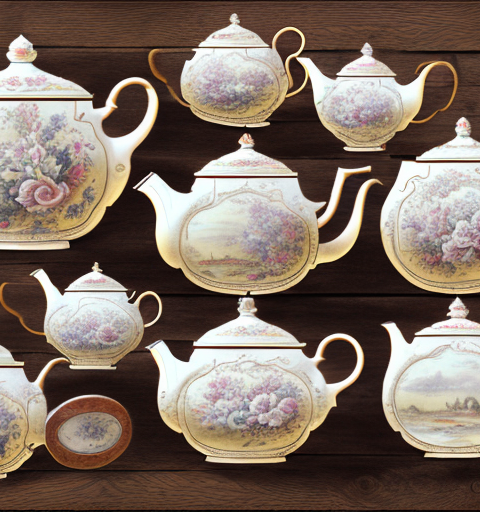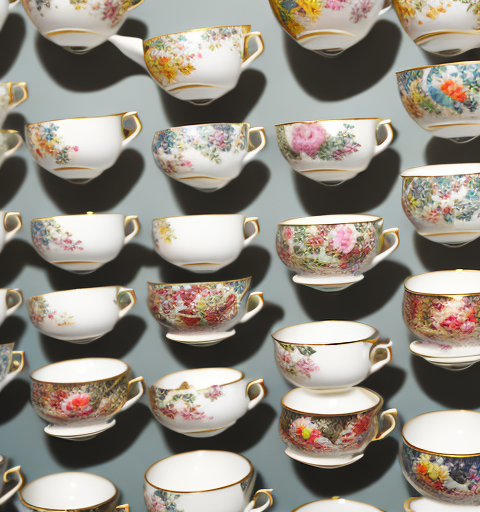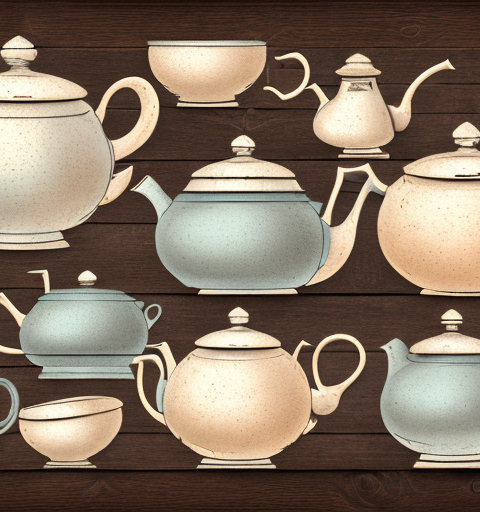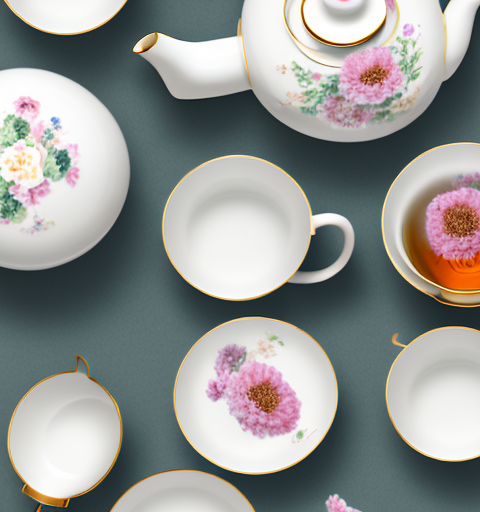If you’re a tea enthusiast, you may have wondered whether your beloved ceramic teapot is suitable for brewing herbal infusions. In this article, we will explore the topic in detail and provide you with all the information you need to know. From understanding the benefits of herbal infusions to exploring the versatility of ceramic teapots, we’ll cover it all. So, grab a cup of tea and let’s dive in!
Understanding the Benefits of Herbal Infusions
Herbal infusions, also known as herbal teas or tisanes, offer a wide range of health benefits. Unlike traditional teas that come from the Camellia sinensis plant, herbal infusions are made from a variety of plants, flowers, and herbs. They are often caffeine-free, making them an excellent choice for those looking for a soothing and calming beverage that can be enjoyed throughout the day.
From aiding digestion and boosting the immune system to promoting relaxation and relieving stress, herbal infusions have been used for centuries for their medicinal properties. Each herb brings its unique health benefits, and by carefully selecting and combining different herbs, you can tailor your brew to suit your specific needs.
In addition to their health benefits, herbal infusions are also known for their delicious flavors and aromas. With a wide variety of herbs and botanicals to choose from, you can create a beverage that not only supports your well-being but also tantalizes your taste buds. Whether you prefer the floral notes of chamomile, the refreshing taste of peppermint, or the earthy flavors of ginger and turmeric, there is an herbal infusion to suit every palate.
Exploring the Versatility of Ceramic Teapots
Ceramic teapots are cherished for their ability to brew tea evenly and retain heat effectively. When it comes to herbal infusions, ceramic teapots offer several advantages. First and foremost, ceramics are known for their excellent heat retention, ensuring that your herbal brew stays warm for a longer time. This allows you to savor each cup at your own pace without worrying about it cooling down too quickly.
Furthermore, ceramic teapots have a porous nature that helps to enhance the flavors of herbal infusions. As you brew the herbs, the ceramic absorbs some of the essential oils, delivering a more robust and aromatic cup of tea. The gentle heat distribution also ensures that the flavors are extracted evenly, resulting in a well-balanced and satisfying brew.
In addition to their heat retention and flavor-enhancing properties, ceramic teapots are also highly versatile in terms of design. With a wide range of shapes, sizes, and colors available, ceramic teapots can be a stylish and decorative addition to any tea collection. Whether you prefer a traditional, elegant design or a modern, minimalist look, there is a ceramic teapot to suit your personal taste and aesthetic preferences. Additionally, ceramic teapots can be adorned with intricate patterns or hand-painted designs, adding a touch of artistry to your tea brewing experience. So not only do ceramic teapots offer practical benefits, but they also allow you to express your individual style and creativity.
The Art of Brewing Herbal Infusions in a Ceramic Teapot
Brewing herbal infusions in a ceramic teapot is a delightful and straightforward process. To start, select your desired herbs and place them in the teapot’s infuser or directly into the pot itself. The amount of herbs will depend on your preferred strength and taste. As a general guideline, use approximately one teaspoon of dried herbs or one tablespoon of fresh herbs per cup of water.
Next, heat water to the appropriate temperature based on the herb you’re using. Different herbs require different water temperatures to extract their flavors optimally. For example, delicate floral herbs such as chamomile and lavender are best brewed with water around 200°F (95°C). On the other hand, woody herbs like rosemary and sage may benefit from hotter water at around 212°F (100°C).
Once the water has reached the desired temperature, pour it over the herbs in the teapot. Allow the infusion to steep for the recommended time, usually between 5 to 10 minutes. Some herbs may require a longer steeping time to reach their full flavor potential. Experimentation is key to finding the perfect balance that suits your taste preferences.
After the infusion has steeped for the recommended time, it’s time to strain the liquid. Carefully remove the infuser or use a fine-mesh strainer to separate the herbs from the infused liquid. This step ensures a smooth and enjoyable drinking experience, free from any herb particles.
Choosing the Right Ceramic Teapot for Herbal Infusions
When it comes to selecting a ceramic teapot for herbal infusions, there are a few factors to consider. Firstly, ensure that the teapot is made from lead-free, food-grade ceramic. This ensures that no harmful chemicals leach into your brew, preserving the purity and quality of your herbal infusion.
Consider the size and capacity of the teapot as well. If you prefer to brew single cups or enjoy multiple infusions throughout the day, a smaller teapot may be more suitable. On the other hand, if you often brew tea for a group of friends or family, a larger teapot with a generous capacity would be ideal.
Lastly, pay attention to the design and aesthetics of the teapot. Choose a style that resonates with you and complements your tea-drinking experience. After all, the pleasure of enjoying a cup of herbal infusion goes beyond its taste; it encompasses the entire sensory experience.
Additionally, it is important to consider the heat retention properties of the ceramic teapot. Ceramic teapots with good heat retention will keep your herbal infusion warm for a longer period of time, allowing you to savor each sip at your own pace. Look for teapots that have thick walls and lids that fit snugly to ensure optimal heat retention.
Step-by-Step Guide to Using a Ceramic Teapot for Herbal Infusions
To help you get started, here is a step-by-step guide to brewing herbal infusions in a ceramic teapot:
- Choose your favorite herbal blend or individual herbs.
- Add the desired amount of herbs to the teapot’s infuser or directly into the pot.
- Heat water to the appropriate temperature for the herbs you’re using.
- Pour the hot water over the herbs in the teapot.
- Allow the infusion to steep for the recommended time.
- Once steeped, pour the brewed herbal infusion into your teacup or mug.
- Sit back, relax, and savor the flavors and aromas of your homemade herbal infusion.
Using a ceramic teapot for brewing herbal infusions has several advantages. Firstly, ceramic is an excellent material for retaining heat, which helps to keep your infusion warm for longer periods of time. Additionally, ceramic teapots are known for their ability to distribute heat evenly, ensuring that your herbs are steeped thoroughly and consistently.
Furthermore, ceramic teapots are non-reactive, meaning they won’t alter the taste or aroma of your herbal infusion. This is particularly important when brewing delicate herbal blends, as it allows you to fully appreciate the natural flavors and scents of the herbs.
Unleashing the Flavor Potential: How Ceramic Teapots Enhance Herbal Infusions
As mentioned earlier, ceramic teapots have the ability to enhance the flavors of herbal infusions. The porous nature of ceramics absorbs some of the essential oils present in the herbs, resulting in a more pronounced and satisfying taste.
Additionally, the even heat distribution of ceramic teapots ensures that the flavors are extracted uniformly from the herbs. This prevents any overpowering or uneven brews, allowing you to enjoy a well-balanced cup of herbal infusion every time.
Furthermore, ceramic teapots are known for their ability to retain heat for longer periods of time. This is especially beneficial for herbal infusions, as the extended steeping time allows for a more thorough extraction of flavors and aromas from the herbs. The result is a richer and more intense infusion that truly captures the essence of the herbs.
In addition to enhancing the flavor, ceramic teapots also add an aesthetic appeal to the tea-drinking experience. With their beautiful and intricate designs, ceramic teapots can elevate the visual presentation of herbal infusions. Whether you are enjoying a cup of tea alone or hosting a tea party, a ceramic teapot can be a delightful centerpiece that adds a touch of elegance and sophistication to the occasion.
Exploring Different Types of Herbal Infusions Perfect for Ceramic Teapots
One of the joys of herbal infusions is the wide variety of flavors and blends available. Whether you prefer soothing floral notes, refreshing citrusy flavors, or invigorating herbal combinations, there is a herbal infusion perfect for your taste buds.
Popular herbal infusions include chamomile, lavender, peppermint, lemon verbena, hibiscus, ginger, and many more. Additionally, you can experiment and create your own unique blends using a combination of herbs to suit your preferences and wellness goals.
When choosing herbal infusions for ceramic teapots, it’s important to consider the brewing time and temperature. Some delicate herbs, like chamomile and lavender, require lower temperatures and shorter steeping times to preserve their delicate flavors. On the other hand, robust herbs like ginger and hibiscus can withstand higher temperatures and longer steeping times without becoming bitter.
Tips and Tricks for Brewing Perfect Herbal Infusions in Your Ceramic Teapot
Here are some helpful tips and tricks to ensure you achieve the perfect cup of herbal infusion:
- Use fresh and high-quality herbs for the best flavor.
- Allow the teapot to preheat by rinsing it with hot water before adding the herbs.
- Practice mindfulness and take a few moments to appreciate the aroma before sipping.
- Experiment with the steeping time to find the optimal taste for each herb.
- Add a touch of honey or lemon for natural sweetness and added flavor if desired.
- Store herbs in airtight containers away from direct light and heat to preserve their freshness.
Additionally, it is important to use filtered or purified water when brewing herbal infusions. Tap water may contain impurities or chemicals that can affect the taste and quality of your tea. By using clean water, you can enhance the natural flavors of the herbs and ensure a pure and refreshing cup of tea.
The Science Behind Using a Ceramic Teapot for Herbal Infusions
The science behind using a ceramic teapot for herbal infusions lies in the material’s ability to retain heat and promote even heat distribution. The porous nature of ceramics enhances the flavors by absorbing essential oils, resulting in a more intense and enjoyable cup of herbal tea.
Furthermore, the teapot’s shape and design play a role in how the herbs infuse with water. The wide base allows for optimal water contact with the herbs, maximizing flavor extraction. The lid helps to trap the essential oils and prevent them from evaporating, preserving the aromas and flavors until you’re ready to enjoy your tea.
In addition to heat retention and flavor enhancement, using a ceramic teapot for herbal infusions also offers the benefit of durability. Ceramic is a sturdy material that can withstand high temperatures, making it ideal for brewing hot herbal teas. It is also resistant to staining and odors, ensuring that your teapot remains clean and free from any lingering flavors or smells.
Maximizing the Health Benefits of Herbal Infusions with a Ceramic Teapot
Beyond their delicious flavors, herbal infusions offer a myriad of health benefits. By using a ceramic teapot, you can maximize these benefits and elevate your tea-drinking experience. The heat retention properties of ceramics ensure that the beneficial compounds in the herbs are effectively extracted and retained in your brew.
Moreover, ceramic teapots do not interfere with the natural properties of the herbs, allowing you to fully experience and enjoy their therapeutic effects. So, not only are you indulging in a delightful beverage, but you’re also nourishing your body and supporting your overall well-being.
In addition to maximizing the extraction of beneficial compounds, using a ceramic teapot also helps to preserve the flavor and aroma of herbal infusions. The porous nature of ceramics allows the tea to breathe, enhancing the infusion process and resulting in a more flavorful and aromatic brew.
Furthermore, ceramic teapots are known for their durability and ability to retain heat. This means that your herbal infusion will stay hot for longer periods, allowing you to savor and enjoy each cup at your own pace. The heat retention properties of ceramics also make them ideal for steeping herbal infusions multiple times, ensuring that you can fully extract all the goodness from your herbs.
Common Mistakes to Avoid When Using a Ceramic Teapot for Herbal Infusions
While brewing herbal infusions in a ceramic teapot is relatively straightforward, there are a few common mistakes to avoid. Firstly, be mindful of using the correct water temperature for each herb. Water that is too hot may result in a bitter brew, while water that’s too cool may not extract the flavors fully.
Additionally, avoid oversteeping your herbal infusions. Each herb has an optimal steeping time, and leaving them in the teapot for too long can result in a bitter or overpowering taste. Experimentation and timing are vital to finding the right balance and achieving a perfectly brewed cup of herbal infusion.
Exploring Alternative Methods: Other Ways to Brew Herbal Infusions in a Ceramic Teapot
Besides using the traditional steeping method, there are alternative ways to brew herbal infusions in a ceramic teapot. One popular method is the cold brew technique, which involves steeping the herbs in cold or room temperature water for several hours or overnight.
This gentle brewing process extracts the flavors more slowly, resulting in a smoother and less bitter infusion. It’s particularly well-suited for delicate flowers and herbs that may lose their flavors when exposed to high temperatures. Simply add the desired herbs to cold water in your ceramic teapot and let it steep for an extended period. The result is a refreshing and subtly flavored herbal infusion.
Finding Your Perfect Brew: Experimenting with Different Tea-to-Water Ratios in a Ceramic Teapot
Each person has their own preference when it comes to the strength of their herbal infusions. While there are general guidelines for herb-to-water ratios, it ultimately boils down to personal taste. Experimenting with different ratios allows you to tailor your brew to your liking.
If you prefer a stronger taste, you can increase the amount of herbs used or extend the steeping time slightly. On the other hand, if you prefer a milder flavor, reduce the herb amount or steep for less time. The beauty of using a ceramic teapot is its flexibility, allowing you to adjust the herb-to-water ratio and brewing parameters to find your perfect cup of herbal infusion.
Enhancing the Aesthetic Experience: Styling Your Ceramic Teapot for Herb-infused Tea Moments
Finally, let’s not forget the aesthetic aspect of using a ceramic teapot for herbal infusions. Your tea-drinking experience can be elevated by the way you style and present your teapot. Choose a teapot that resonates with your personal style and complements your surroundings.
Add embellishments such as teapot cozies, trays, or beautiful teacups to create a visually appealing tea setup. Whether you enjoy your herbal infusion alone or with friends, taking the time to create an inviting and visually pleasing tea moment adds an extra layer of enjoyment to the overall experience.
There you have it – a comprehensive guide on using your ceramic teapot for herbal infusions. From understanding the benefits of herbal infusions to exploring different brewing methods and tips, you now have all the information you need to enjoy a delightful cup of herbal tea. So, dust off that ceramic teapot, select your favorite herbs, and embark on a journey of aroma, flavor, and well-being!






